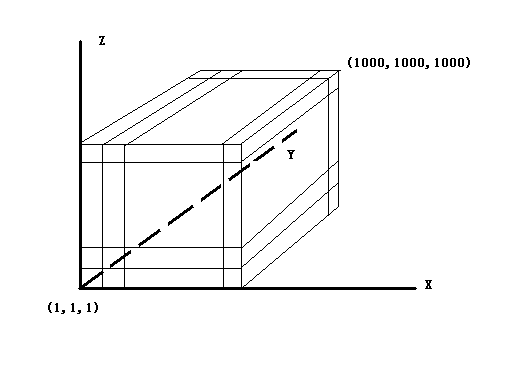hdu3533 Light Switching Game
| Time Limit: 1000MS | Memory Limit: 131072K | |
| Total Submissions: 492 | Accepted: 286 |
Description
The Light Switching Game is played on a 1000 × 1000 × 1000 cube of cells with a light in each cell, as Figure.1 shows. Initially, most of the lights are off while exactly N lights are on. Two players take moves alternately. A move consists of switching the lights at the corners of a cuboid, i.e. (x1,y1,z1), (x1,y1,z2), (x1,y2,z1), (x1,y2,z2), (x2,y1,z1), (x2,y1,z2), (x2,y2,z1), (x2,y2,z2) where 1 ≤ x1 ≤ x2 ≤ 1000, 1 ≤y1 ≤ y2 ≤ 1000, 1 ≤z1 ≤ z2 ≤ 1000 and the light at the corner (x2,y2,z2) must be on (and turned off after the move). Notice the cuboid is possibly degenerated to a rectangle, a line or even a single cell so that the player may also switching four, two or one besides eight lights in a move. The player loses the game when he can not take a move.

Figure.1
You will find out whether the second player can win if both players play optimally.
Input
Every test case starts with one line containing a single number N indicating the number of lights which is initially on. ( N ≤ 100)
Each of the next N lines contains the coordinates ( x, y, z) (1 ≤ x, y, z ≤ 1000) showing that the light at this position is on initially.
Output
Sample Input
4 5 11 30 5 19 19 23 15 6 2 26 16 3 9 20 9 8 1 28 30 22 26
Sample Output
Yes No
论文题三维的nim积,转化成二维的就可以了!
#include <iostream> #include <stdio.h> using namespace std; int pri[2][2]={0,0,0,1}; int get(int x,int y){ if(x<2)return pri[x][y]; int i=0,p,t,s; while(1){ if((1<<(1<<i))<=x&&x<(1<<(1<<(i+1)))) break; i++; } int m=1<<(1<<i); p=x/m;t=y/m;s=y-t*m; int t1=get(p,t); int t2=get(p,s); return m*(t1^t2)^get(m/2,t1); } int getsg(int x,int y){ if(x<y)return getsg(y,x); if(x<2)return pri[x][y]; int i=0,p,q,t,s; while(1){ if((1<<(1<<i))<=x&&x<(1<<(1<<(i+1)))) break; i++; } int m=1<<(1<<i); p=x/m;q=x-m*p;t=y/m;s=y-t*m; int t1=getsg(p,t); int t2=getsg(p,s)^getsg(q,t); int t3=getsg(q,s); return m*(t1^t2)^t3^get(m/2,t1); } int main() { int n,ans,x,y,z; while(scanf("%d",&n)!=EOF){ ans=0; while(n--){ scanf("%d%d%d",&x,&y,&z); ans^=getsg(x,getsg(y,z)); } if(!ans)printf("Yes\n"); else printf("No\n"); } return 0; }